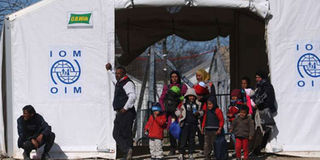Some efforts to help refugees make me cringe

Women and children stand next to an International Organization for Migration tent as they wait with other migrants and refugees to cross the Greek-Macedonian border near Idomeni in northern Greece on February 21, 2016. PHOTO | SAKIS MITROLIDIS | AFP
What you need to know:
- Refugees and internally displaced people who emerge from the Syrian and other crises may appreciate donated underwear.
- But I can bet that most would prefer an end to the conflict so that they can go back to their old lives and be in a position to purchase their own underclothes and other necessities instead of depending on well-wishers from abroad.
The world is experiencing the worst refugee crisis since the Second World War. There are currently more than 20 million refugees and an estimated 60 million people who have been forced to flee their homes.
The desire to help these people is understandable, which is why we applaud efforts by individuals and charities that go out of their way to make the lives of refugees bearable.
However, some of these efforts make me cringe. Take, for instance, a campaign called Bras not Bombs started by a British woman called Caroline Kerr, who sends underwear that people no longer need to female refugees.
Ms Kerr has been collecting bras and underpants from across Britain and transporting them to refugees and internally displaced women and girls in Greece and Syria.
She claims that she was motivated to start the campaign after she realised that pregnant and raped women in camps had no clean underwear.
When she sorts the underwear she receives, she makes sure that none of it is “too sexy” as she has to be “mindful of who’s in the camps and make sure they’re given the dignity they need”.
She told TheIndependent newspaper that “it’s important to make sure everything is soft, and not sexual in any way. Cotton and stretchy is generally best”.
I do not know how Ms Kerr believes that underwear (not sure if some or all of it is used) will restore the dignity of refugees.
INTIMATE GARMENT
Wearing an intimate garment that once belonged to someone else to me is in itself a kind of indignity. It is like giving a beggar your used toothbrush instead of buying him a new one. Or like buying a raped woman a new dress instead of giving her medical and psychological care.
Would Ms Kerr herself agree to wear underwear whose origins are unknown? If she believed that female refugees were in dire need of underwear, and she wanted to help, why didn’t she ask her fellow donors to go to Marks and Spencer and pick up new underwear for the refugees?
The problem with this “band-aid solution” to a problem that is extremely complex is that it allows people and countries to ease their conscience about a situation that they or their governments are partly responsible for creating in the first place.
For example, when austerity measures were imposed on African countries by the International Monetary Fund in the 1980s and 1990s, rich donor countries flooded African NGOs and governments with aid to help alleviate some of the consequences of austerity.
They called it the “human face” of austerity, even though they themselves were responsible for the poverty that resulted from these measures.
Aid allows donors to gloss over the fact that much of the poverty, inequality, and poor services that poor countries experience is the result of colonialism, imposed economic reforms, unfair trade policies, and corrupt governments propped up by the very same donors.
DISTORTS ECONOMIES
Aid also distorts local economies. In Somalia, for instance, decades of food aid have destroyed local farming and made previously food-sufficient communities dependent on external aid (much of which, by the way, is stolen by corrupt cartels and sold in markets).
If Ms Kerr wants to stop the mayhem in the Middle East that has led to the refugee crisis, she might want to pressure her government to stop selling arms to rogue states and repressive regimes such as Saudi Arabia, which has been accused of committing war crimes in its military operations in Yemen, including bombing hospitals, schools, factories, and wedding parties.
According to a report published in TheIndependent, since 2010, Britain has sold arms to 22 of the 30 countries on the British Government’s own human rights watch list. A third of these weapons were sold to countries in the Middle East.
Critics say that the selling of arms to dictatorships is hypocritical as it undermines Britain’s efforts to promote human rights and democracy around the world.
The refugees and internally displaced people who emerge from the Syrian and other crises may appreciate donated underwear, but I can bet that most would prefer an end to the conflict so that they can go back to their old lives and be in a position to purchase their own underclothes, among other necessities, instead of depending on well-wishers from abroad.





